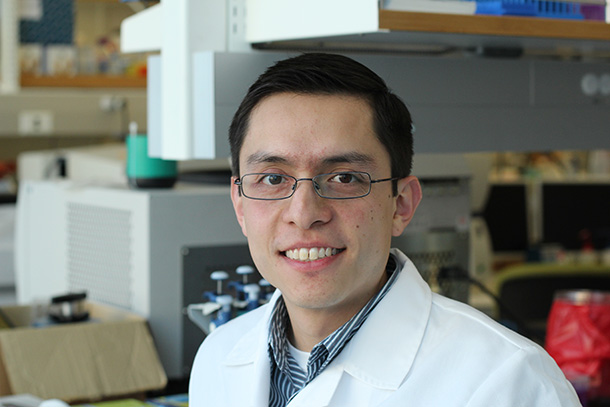We can learn a lot from fly brains, according to Ismael Fernández-Hernández, PhD, a postdoctoral fellow in the USC Stem Cell laboratory of Michael Bonaguidi, PhD.
Fernández-Hernández is an accomplished researcher who showed that adult fruit flies have the potential for replenishing brain cells lost to disease, injury or aging. He is also one of 11 new Mexican postdoctoral fellows at USC jointly funded by the university and the Consejo Nacional de Ciencia y Tecnología (CONACYT) — Mexico’s equivalent of the National Science Foundation.
“This arrangement between the USC and CONACYT is great, because it allows Mexican researchers to come here to a distinguished university with state-of-the-art facilities to increase their knowledge and experience, which eventually benefits people in both countries,” he said. “This has been a very important opportunity for me.”
As a USC-CONACYT Provost Fellow, Fernández-Hernández will receive funding for up to two years of postdoctoral research at the Eli and Edythe Broad Center for Regenerative Medicine and Stem Cell Research at USC, part of the Keck School of Medicine of USC.
After his two-year postdoctoral fellowship at USC, Fernández-Hernández and his wife are open to opportunities anywhere in the world. Eventually, however, he hopes to start his own laboratory in Mexico, while maintaining collaborations with his USC colleagues.
He began using fruit flies to study cancer during his master’s degree at the Spanish National Cancer Research Centre (CNIO) and the Autonomous University of Madrid in Spain. Then his PhD work at the University of Bern in Switzerland showed, for the first time, that fruit flies have a remarkable regenerative capacity to produce new neurons after brain injury.
He continued to work with fruit flies while studying brain tumors during his first postdoc at the Institute for Research in Biomedicine (IRB) in Barcelona, Spain.
In the Bonaguidi Lab, Fernández-Hernández is using these surging swarms of flies to find genetic factors and test drug-like compounds that may help the brain counteract degeneration from disease, aging or injury.
“Flies are, genetically speaking, quite related to humans,” Fernández-Hernández said. “Sixty percent of the genes causing diseases in humans are shared with flies. Along with several technical advantages, that’s why it is a very suitable model organism to study the genetic causes of diseases.”
— Cristy Lytal


